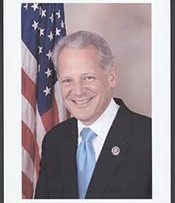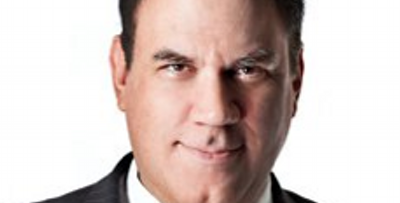Can Trump match Reagan when it comes to capturing more than 30% of the Jewish vote?
Former President Donald Trump is well-positioned to win a significant number of Jewish votes in next month’s presidential election because of his strong support for Israel, according to a former U.S. senator and Jewish Republican leader.
“He is certainly going to do better than we have done historically,” Norm Coleman told the Baltimore Post-Examiner.
Coleman represented Minnesota in the upper chamber from 2003-09. He is a lobbyist and national chairman of the Republican Jewish Coalition. The group seeks to enhance ties between the Jewish community and the GOP.
The Jewish vote, particularly in presidential elections, tends to be overwhelmingly Democratic. Trump captured about 25% of the Jewish vote in 2016 and about 30% in 2020. There are about 5.8 million Jewish adults in the U.S., so 30% of that would be 1,740,000.
Not since Ronald Reagan in 1980 has a Republican received nearly 40% of the Jewish vote. It is not entirely clear how Reagan pulled off a record 39% of the Jewish vote.
But Reagan’s strong support for Israel, pro-business credentials, and the seemingly broad consensus that Democrat Jimmy Carter was not up to the job likely all contributed to Reagan’s strong showing in the Jewish community and his having carried 40 states that year.
In 1988, Reagan’s vice-president and eventual successor in the White House, George H.W. Bush, won 35% of the Jewish vote in an electoral blowout against Democrat Michael Dukakis.
However, Bush, who clashed with pro-Israel groups during his term in office, only carried 11% of the Jewish vote in his re-election campaign in 1992 and lost in a landslide to Democrat Bill Clinton.
Orthodox Jews tend to vote Republican, but they only account for about 10% of the overall Jewish population in the U.S.

(www.congress.gov)
Coleman, who was a Democrat until the mid-1990s, declined to speculate about Trump’s potential percentage of the Jewish vote.
But Coleman said it will be substantial both because of the former president’s strong support for Israel, and because Harris has arguably wavered in her support of Israel at a time when the Jewish state is prosecuting a war against terrorist groups.
The Fallout of the War and the Impact on the Election
The war between Israel and Hamas-the terrorist ruling faction in Gaza, began on Oct. 7, 2023, with a brutal terrorist attack that killed more than 1,200 Israeli civilians. The war may weigh heavily on Jewish and pro-Palestinian voters.
As of today, more than 40,000 Palestinians are dead, according to figures from the Hamas-controlled Gaza Health Ministry.
The war now stretches to Lebanon, where the Iranian-backed terrorist proxy Hezbollah is being decimated by Israeli airstrikes and pager explosions targeting the group’s senior leaders.
Iran, which is believed to be close to possessing nuclear weapons, has in turn threatened Israel with retaliation.
Israel is believed to be preparing a preemptive attack on Iran in the coming months.
The Biden administration has provided Israel with anti-missile systems to shoot down rockets and missiles fired by Iranian proxies. But the administration has tried to discourage Israel from attacking Iran, especially the country’s nuclear facilities.
The administration is pressing for an immediate ceasefire and a return of the remaining hostages captured by Hamas.
The mounting civilian casualties in Gaza led the Biden administration to step-up humanitarian aid to the Palestinian population, providing large quantities of food and medical supplies.
But some of the aid workers have been killed due to the Hamas policy of using its civilian population as human shields in the face of Israeli airstrikes. This policy allows Hamas to claim a moral victory whenever instruments of civilian infrastructure, such as schools and hospitals, are destroyed by Israel.
The fallout from all this has led to widespread anti-Israel protests on college campuses and Jewish students being harassed.
The Democratic Party has been receptive to the pro-Palestinian message, while Republicans, who have a strong evangelical Christian base, have remained steadfast in their support of Israel.
Trump has said he favors deporting pro-Gaza protestors studying in the U.S. on student visas.
Harris has condemned the anti-Semitic sentiments of some of the protestors but has also said that those who advocate Palestinian self-determination have a right to be heard.
Trump, who presided over a peace treaty between Israel and four Arab countries in 2020, has said if he is again elected he would help quickly end the war in Gaza. Trump also has said that if Harris wins Israel will cease to exist “within two years.”
Vice President Kamala Harris, like her boss, President Joe Biden, has called for an immediate ceasefire.
Harris has called Iran America’s “greatest adversary” and has blamed Trump for having had the U.S. withdraw from a nuclear arms agreement that was brokered by the Obama administration and five other nations.
Republicans have long blasted the agreement as a form of appeasement.
Israel killed Hamas leader Yahya Sinwar in Rafah on Thursday via tank fire after Sinwar had been located by a drone surveilling the area.
The killing of Sinwar, who is believed to have been the principal organizer of the Oct. 7th attacks, has served to renew hopes for a possible ceasefire and hostage deal.

Trump is Israel’s ‘best friend’
“He (Trump) was the best friend that Israel ever had in the White House,” Coleman said. “He moved the [U.S.] embassy [from Tel Aviv] to Jerusalem. He recognized Jerusalem as the capital [of Israel] which changed U.S. policy. He recognized Israel’s sovereignty over the Golan Heights…We saw it with a record, as opposed to Harris, whose first act after she was nominated for president was to not show up to hear the democratically-elected prime minister of Israel address a bipartisan group of the United States Congress.”
Harris did not attend Prime Minister Netanyahu’s July 25th speech, but she did have a private meeting with Netanyahu later that day.
As vice president, she would have been tasked with presiding over the ceremonial event alongside House Speaker Mike Johnson (R-La.) Instead, Sen. Ben Cardin (D-Md.), who is chair of the Foreign Relations Committee, presided over the speech.
Coleman said Harris may have been influenced to skip the speech by the “Hamas wing” of the Democratic Party.
“The Ilhan Omars. The Rashida Tlaibs. And all the others. So, you have the contrast between the two. And then you have since October 7th, the incredible explosion of anti-Semitism on college campuses throughout the United States.”
Coleman did acknowledge that anti-Semitism is present in the extremes of both major political parties.
But Coleman said that it is somewhat ironic that the progressive civil rights alliance born in the 1960s that once so strongly united Jews and African-Americans and other minority groups today no longer welcomes Jews.
“We marched in civil rights: Goodman, Schwerner, Chaney. Three young men killed in Mississippi by the Klan. Two were Jews. We have this long history of marching on civil rights. All of a sudden, we see post-October 7th…Black Lives Matter. They don’t like us. They are virulently anti-Semitic and anti-Zionist. So, I think there is an awakening going to as to who our friends are, and who are not our friends. And I hope there is a deeper appreciation for what President Trump brought when he was in the White House and for what he will bring in the White House in terms of support for Israel.”
Coleman said that although the Jewish vote is small, accounting for just about 2.5% of the general electorate, it can make a significant difference in critical swing states-many of which have large Jewish populations.
Michigan is one of those states. About 90,000 Jews live there, which is roughly 1% of the state’s total population.
However, Michigan also has the largest Arab-American population in the nation. The state’s Arab-American community exceeds 200,000 people and is largely based in the Detroit metro area.
Many are practicing Muslims who sympathize with the Palestinians living in Gaza and have deep antipathy for the Biden administration’s support for Israel. Some have even threatened to stay home on Election Day. And a few have said they might vote for Trump. These two factors could make it very difficult for Harris to carry the state.
The largest swing state is Pennsylvania, which is home to about 300,000 Jewish voters. The state also has a popular Jewish governor, Democrat Josh Shapiro.
Shapiro was strongly considered by Harris as a possible running mate. But she ultimately chose Minnesota Gov. Tim Walz.
Some Jewish leaders alleged that that decision was in part motivated by anti-Semitism and/or anti-Israel sentiment by some in the Democratic Party. The basis for the allegation was that Shapiro’s views on Israel were consistent with that of many mainstream Democrats and that therefore criticisms that he was too pro-Israel to be added to the ticket were solely based on assumptions due to his religion.
Harris’ husband, Douglas Emhoff, is Jewish and has taken to the campaign trail to vouch for the vice president’s commitment to both fighting anti-Semitism and supporting Israel. Harris also has expressed strong support for those positions.
Trump’s son-in-law and former senior White House adviser, Jared Kushner, is an Orthodox Jew. The former president’s eldest daughter, Ivanka Trump, converted to Judaism in 2009 when she married Kushner. They have raised their three children in the Jewish faith.
Jewish Democrats say Trump is unlikely to make significant inroads among Jewish voters

“While the Orthodox Jewish community is demonstrating higher levels of support for Trump, the vast majority of American Jewish voters haven’t gotten over his association with prominent neo-Nazis, his periodic diatribes questioning their loyalty or his views on women’s rights. This is particularly strong in moderate suburbs of battleground states,” said former New York Rep. Steve Israel, who served in Congress from 2001-17.
“Jewish voters continue to support Kamala Harris and the Democrats by more than two-to-one, just as they have supported the Democrats by more than two-to-one in every election in memory,” said former Florida Rep. Alan Grayson, who served in Congress from 2009-17.
Grayson said Jewish support for the Democratic Party is rooted in more than just support for Israel.
“The historical root of this is that Republicans closed the country to Jewish immigrants for many

years, while Democrats welcomed Irish, Italian, Polish, and Jewish immigrants. For instance, my mother’s parents were turned away from America. That’s not the sort of thing you forget. The primary reason for Jewish support today is that the Democrats follow the fundamental ethical precept of Judaism called “tikkun olam” – heal the world. No one can make a serious argument that the Republicans do, much less Donald Trump.”
Grayson pushed back against claims that Democrats are less supportive of Israel than Republicans.
“Most Jews were extremely gratified by President Biden’s visit to Israel after the Hamas invasion and slaughter, as well as the support that his administration has offered without dictating Israel’s anti-terrorist strategy. In fact, many Jews credit the Biden Administration to standing up against any anti-Israel sentiment in either party.”
Grayson said Jews have good reasons to be reluctant to support Trump.
“Many Jews recognize that Trump can be your friend today and your bitter enemy tomorrow. Many Jews have noted his anti-Semitic remarks to Jewish audiences, and his current effort to try to blame his loss this year on Jewish voters.“
Richard Vatz, a professor emeritus of political persuasion at Towson University, said Trump may “improve” his performance among Jewish voters, but is unlikely to secure a “majority.”
Vatz noted that the strong “affinity” many Jewish voters have for the Democratic Party dates back to President Franklin Delano Roosevelt in the 1930s.
“At a time in the 1930s when there was widespread open anti-Semitism in the United States, especially on the right, FDR opposed overt anti-Semitism and even had Jewish members in his Administration, such as the Secretary of the Treasury, Henry Morgenthau Jr. On the other hand, less talked about is FDR’s refusal of admittance of Jewish refugees from the Third Reich coming to the United States, leading to many of their deaths.”
Vatz said he is skeptical of the popular narrative that support for the Democratic Party is in the best interests of the Jewish community.
“The myth of FDR and the Democratic Party’s strong support for Jewish people lasts to this day. However, with The Squad’s overt anti-Semitism and the Biden Administration’s conflicted support for Israel and Jewish people, including Democrats like Chris Van Hollen and others, as well as Biden and Harris’ indecision on sending necessary munitions to the Jewish State during its time of maximum peril, there will be an attenuation of Jewish voting Democratic support, but not majorly. In contrast, Donald Trump’s strong support for Israel should earn him some additional voting support.”
What will happen on Election Day?
A recent poll showed that Jewish voters prefer Harris over Trump by a 2-1 margin-62% compared with 31%.
But if Trump carries 30% or greater of the Jewish vote, that would still be a respectable showing for a Republican.
It would put him in line with what Mitt Romney netted in 2012 and with what Reagan received in his re-election campaign in 1984.
But will it help put Trump over the top to become the only second president since Grover Cleveland in 1892 to win two non-consecutive terms?

Bryan is the managing editor of Baltimore Post-Examiner.
He is an award-winning political journalist who has extensive experience covering Congress and Maryland state government. His work includes coverage of the first election of President Donald Trump, the confirmation hearings of Supreme Court Justice Brett Kavanaugh and attorneys general William Barr and Jeff Sessions, the Maryland General Assembly, Gov. Larry Hogan, and the COVID-19 pandemic.
Bryan has broken stories involving athletic and sexual assault scandals with the Baltimore Post-Examiner.
His original UMBC investigation gained international attention, was featured in People Magazine and he was interviewed by ABC’s “Good Morning America” and local radio stations. Bryan broke subsequent stories documenting UMBC’s omission of a sexual assault on their daily crime log and a federal investigation related to the university’s handling of an alleged sexual assault.

